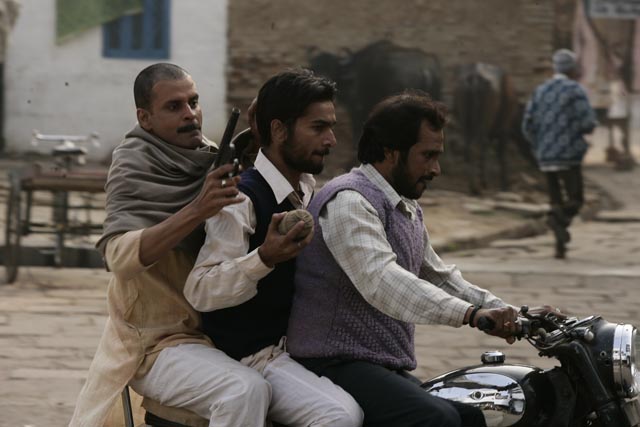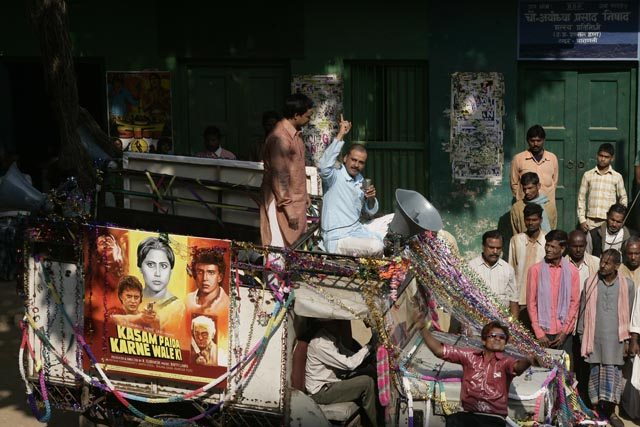
Anurag Kashyap: “I’m a Thief. I borrow from people’s lives”
On closing night of the New York Indian Film Festival, it was a packed house at Skirball Center for the Performing Arts. The audience was transported quite literally to the wild, wild world of Wasseypur where human blood gushes like water, gunshots ring out as freely as birdsong, and no one is burdened with a conscience or a moral compass.
Anurag Kashyap, who received a standing ovation at Cannes’ Directors Fortnight for his 5-hour plus epic ‘Gangs of Wasseypur’, enthralled the New York audiences with a first look at this juggernaut of revenge and rival godfathers set in rural India.
As the Hollywood Reporter noted, “Kashyap, whose reputation as a screenwriter and controversial director reach a culmination in this film, is the real behind-the-scenes godfather, never losing control over the story-telling or hundreds of actors, and allowing tongue-in-cheek diversions in the second half that confirm his command over the sprawling material.”
Indeed, the film was three years in the making, comes in two parts, totaling a massive 5 hours 20 minutes and has 25 songs. The NY audience got to see only the first half but hungrily clamored for more.
Once Upon a Time in Wasseypur ….
Anurag Kashyap: “I become emotionally naked with my actors”
Q: Wasseypur is very real and there is not one false note, be it in the music, the lingo or the inhabitants. How do you get such authentic performances?
I’ve had a very strong theater background and I’ve found a lot of actors through theater. I do theater workshops with my actors where we open up and where I become emotionally naked with my actors, whether it’s about my marriage which didn’t work, my flings, about the world and they start opening up.
In that workshop everyone talks about themselves. Scenes come out of that, out of their own lives. I can write them and put them together very well but I cannot imagine all those scenes. I’m not that big a genius. I’m a thief – I borrow from people’s lives.

Q: What was the most memorable part of the screening of ‘The Gangs of Wasseypur’ at Cannes?
The people just liked the movie so much – they stayed there for 5 hours 20 minutes, enjoying and sitting for the entire movie. It was a full house. The biggest fear had been that it’s too long so when that didn’t come true then everything is fine and that’s what I guess was amazing.
Q: Do you think things are changing for Indian films in the international market? Earlier the length and the songs were regarded as negatives. Here you have 14 songs in just the first half!
Music is a very universal thing – everyone loves music. The problem with Bollywood has been that actors suddenly start singing and dancing. We’ve used songs in the background and that’s probably more relatable. I was making a film for the Indian market and was not thinking of Cannes. I think all that happened by chance!
Q: What do you hope audiences will take away from Wasseypur?
I just hope they enjoy the experience and the film stays with them. That’s all, nothing more. I would just want them to enjoy the movie.
Q: Does the violence and bloodshed ever come into your dreams – you must be immersed in it!
No, not at all – I sleep very well after my shoots!
Q. You have always been the one on the road less traveled – or gone where there is not even a road – just a path. How did that happen?
I think it’s very natural. For me, I would dig the hard way if I was doing what everyone else is doing – I’m doing what comes naturally to me. In India it might be the road less traveled but all over the world people are traveling on harder roads. Seeing them in their struggles gives me confidence.
Q: What are your memories of cinema in your childhood?
In childhood it was just one Sunday in the month when we would rent a VCR to watch a movie. We went to cinema halls very few times, only when an Amitabh Bachchan movie released in Lucknow – then we would travel to the theater. Otherwise it was all on a rented VCR.
Later, much later, at a film festival in Delhi where I saw the films of de Sica, for the first time I related to what I was watching not as something separate or other worldly but something that I could do too.
Q: Was writing the first step for you into the world of cinema?
Yes, it was because I did not know any other way in. I went to Bombay to be part of the movies – and I was ready to do anything. I did everything from acting to being an assistant. Writing was the easy way in because surprisingly in the Hindi film industry not many people speak and write Hindi – that was my big ticket!
Q: All your movies are gritty and rooted in reality. You seem to be the insider. What’s the process in your mind of weaving tales that are tied to reality?
I don’t know – that’s probably the only thing I can do. It’s a natural process. I’ve lived a life in small towns across India and I borrow much from life – I relate to it and that’s why I create it. For me cinema that has mattered always has been real – even if it’s a big Hollywood movie. Take a random example – ‘Transformers’ – the sense of realism of those robots is very real. When they do special effects, there’s a realism to it. Just because they’ve created a transformer they don’t throw away logic.
Hindi cinema throws away logic all the time – so comparatively that’s why my films look real. Realism is the first main ingredient of cinema, there first has to be realism. Hindi films are very fake. My films might look real but compared to other films, I’m still very filmi.
Behind the Scenes in Wasseypur with Anurag Kashyap
Q: In this 100th year of Indian cinema how far do you think we’ve come and where are we headed?
I think we have a long way to go – even if we reach where we already were in the 50’s and 60’s it will be damn good.
Q: You mean we’ve regressed, we’ve gone back?
Yeah, yeah. I think after the 70’s we went back a bit. We were much more progressive, less moralistic and we were more daring than we are now.
Q: Your advice to young filmmakers?
They should just tell their stories and find their voice instead of trying to be someone else. I think the world is interested in a new original filmmaker – not a copy, a poor copy of someone else.
Q: What takes you through your good times and bad times?
My work and my wife and my daughter. I believe that one should never stop working, whatever happens. Just don’t stop working.
Q: Anything fun to tell me about life with Kalki?
Nothing – we hardly even get to see each other. We are always figuring out time to meet!
Q: What gives you the most pleasure in life?
All my life cinema has given me the most pleasure – always. Be it watching movies or making movies. I like shooting, I like writing, I like creating – anything to do with cinema.
(C) Lavina Melwani
(This article first appeared in The Hindu )

1 Comment
Pingback: | Lassi With Lavina